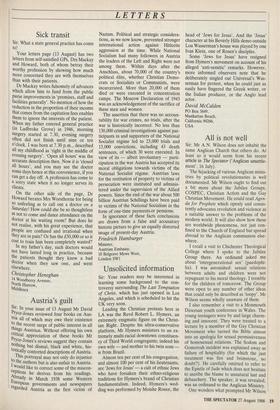Austria's guilt
Sir: In your issue of 13 August Mr David Pryce-Jones reviewed four books on Aus- tria all of which may owe their existence to the recent surge of public interest in all things Austrian. Without offering his own Critical appreciation of these books Mr Pryce-Jones's reviews suggest they contain nothing but dismal, black and white, his- torically contorted descriptions of Austria. This portrayal may not only do injustice to the authors but is also unfair to Austria. I would like to correct some of the miscon- ceptions he derives from his readings. Already in March 1938 some Western European governments and newspapers regarded Austria as the first victim of Nazism. Political and strategic considera- tions, as we now know, prevented stronger international action against Hitlerite aggression at the time. While National Socialism had many followers in Austria the leaders of the Left and Right were not among them. Within days after the Anschluss, about 70,000 of the country's political elite, whether Christian Demo- crats or Socialists or Communists, were incarcerated. More than 20,000 of them died or were executed in concentration camps. The Moscow Declaration of 1943 was an acknowledgement of the sacrifice of these men and women.
The assertion that there was no accoun- tability for war crimes, no trials, after the war is historically incorrect. No less than 130,000 criminal investigations against par- ticipants in and supporters of the National Socialist regime led to 23,000 trials and 13,000 convictions, including 43 death sentences, of which 30 were executed. In view of its — albeit involuntary — parti- cipation in the war Austria has accepted its moral obligations towards victims of the National Socialist regime. Austrian laws for the restitution of property to victims of persecution were instituted and adminis- tered under the supervision of the Allied powers. Since the end of the war about 500 billion Austrian Schillings have been paid to victims of the National Socialism in the form of one-time payments or pensions.
In ignorance of these facts conclusions are drawn from a false and accusatory historic picture to give an equally distorted image of present-day Austria.
Friedrich Hamburger
Minister, Austrian Embassy, 18 Belgrave Mews West, London SW1














































 Previous page
Previous page